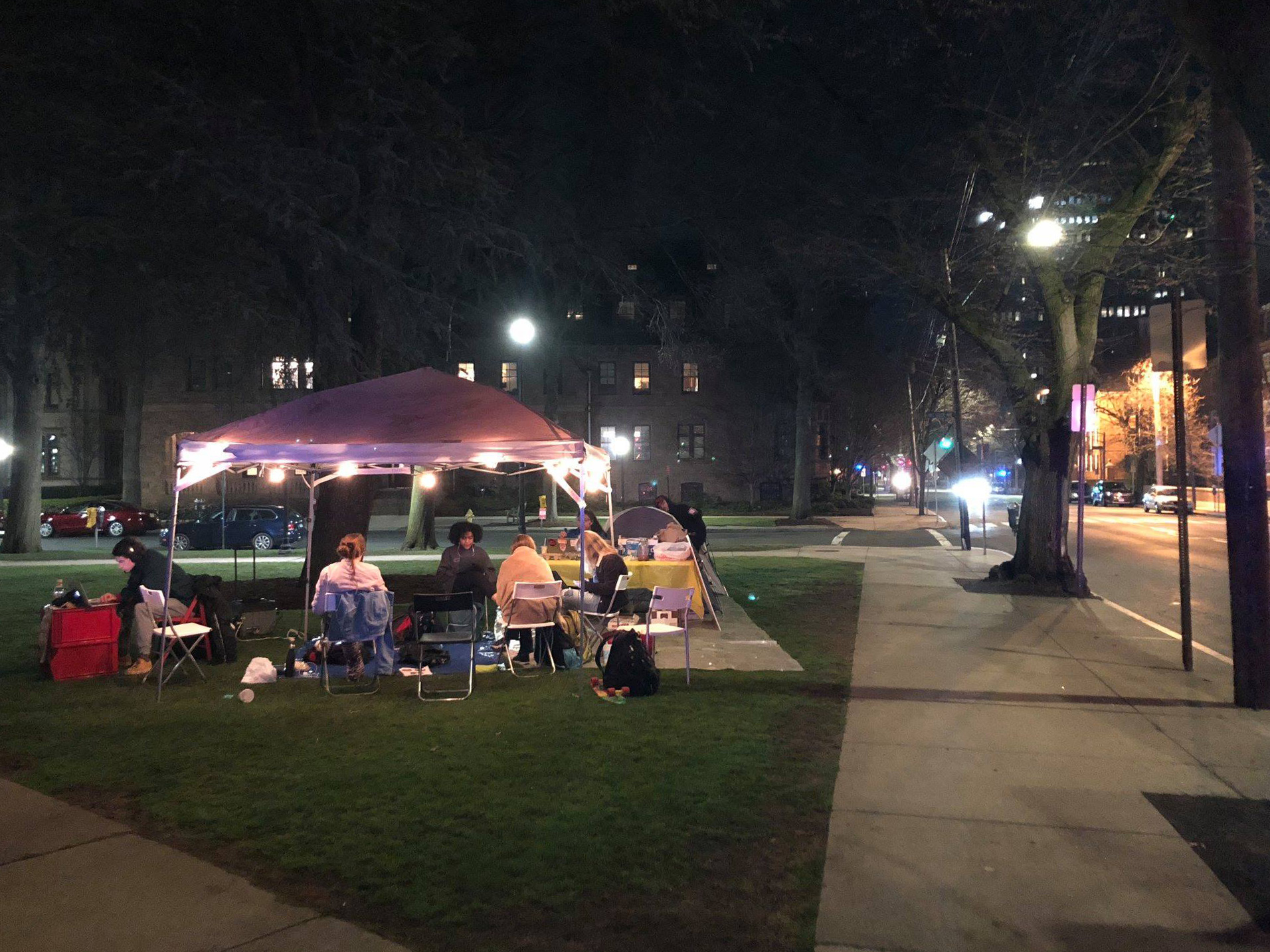
Courtesy of Hannah Schmitt
Students Unite Now, an undergraduate group protesting the student effort portion of Yale’s financial aid package, set up an encampment outside Salovey’s office in Sheffield-Sterling-Strathcona Hall over the weekend. The encampment was disbanded Sunday evening.
SUN protestors set up the encampment at 10 a.m. on Friday inside SSS. At noon, SUN held a concurrent demonstration at the Women’s Table on Cross Campus, calling for an end to the student effort — colloquially known as the student income contribution. Over 120 students attended the demonstration and marched from the Women’s Table to SSS. On Friday evening, Dean of Student Affairs Camille Lizarríbar told protesters that if they did not leave the building by midnight, the Yale Police Department would cite them for trespassing.
The next morning, the group set up an encampment outside of the building and remained there for two days. On Sunday, Yale College Dean Marvin Chun told protestors that they needed to pack up their tents due to safety concerns — an oncoming thunderstorm. Protestors reluctantly complied, telling the News that “they could handle some rain.”
This past week, SUN also released a report about student experiences with the student effort portion of their financial aid.
Student effort is the amount of money Yale expects students on financial aid to contribute to their education yearly, according to Director of Undergraduate Financial Aid Scott Wallace-Juedes. The amount equals the sum of the “student share” — the amount the University expects students on financial aid to earn through summer employment — and the “on-campus employment option” — the amount the University expects students to earn through work-study — according to the financial aid website.
The student effort for most upper-level students with standard levels of need is $5,950 per year, and most of this amount is not paid directly to Yale, but rather used to pay unbilled costs such as textbooks and travel to and from Yale. Members of SUN, who are advocating for Yale to cover the student effort portion of tuition argue that having to earn money to pay the student effort often has a harmful effect on their Yale experience.
Chun and Dean of Undergraduate Admissions Jeremiah Quinlan visited the encampment on Sunday for a “brief, but … productive” conversation, according to Quinlan. He added that he hopes to continue these conversations about financial aid moving forward.
“I hope we can continue … trying to get a better understanding about what specific student concerns are about financing their Yale experience,” Quinlan said. “We want to hear more about concerns students have about having to work long hours or feeling like they are not able to have the full Yale experience and connecting that to policy discussions.”
When the News visited the encampment on Sunday shortly after Quinlan and Chun’s visit, SUN had set up three tents, and a dozen students were eating lunch and discussing the protest.
Still, Murray said he appreciated Quinlan and Chun’s visits.
“I feel that the fight to eliminate the SIC is rooted in a deeper problem, and that’s the lack of regard Yale has for the concerns of people like us, low-income students of color,” one student, Josh Murray ’20 told the News. “The administration’s first instinct wasn’t coming to talk to us — it was sending [Dean Lizarribar] to threaten us with the police. Yale says they value diversity and equity, but how am I supposed to believe that when that’s their first response to me and my friends? This is the problem at the root of the SIC: Yale doesn’t value low-income students of color. One of the first steps they can take is eliminating the SIC.”
According to a SUN press release, the group’s new report, which was released on Friday “explains the costs of the Student Income Contribution on the Yale community and why Yale can afford to eliminate it.”
The report shares stories of students from various backgrounds — including those who are international and those who are the first person in their family to go to college — who say they are harmed by having to pay the student effort portion of tuition.
“The reason we decided to do this report is because I think it is really helpful and clarifying to have something written especially for students who are paying the [student income] contribution and …see this [pamphlet] and see their experiences are shared by a lot of other people and that there is a lot of urgency around eliminating the contribution,” said Julia Salseda-Angeles ‘19, a student affiliated with SUN.
Incoming Yale College Council President Kahlil Greene ’21, who attended the protest on Friday afternoon, told the News that he wanted to support SUN and those who want to eliminate the student effort.
“I believe external pressure from student activists is important in reforming campus policy,” he said. “As YCC President, I will use my internal and institutional power, coupled with the work of student activists, to push for policies that make this campus more equitable.”
SUN has protested the student effort portion of a financial aid package for the past six years.
Skakel McCooey | skakel.mccooey@yale.edu







